Search the Special Collections and Archives Portal
Search Results

Transcript of interview with Lt. Harry Fagel by Barbara Tabach, April 15, 2016 and January 13, 2017
Date
Archival Collection
Description
In the signature line of Harry Fagel?s emails is a reads: Be the light in dark spaces. This illumines the person that Harry is both as a police officer and a poet in Las Vegas. Harry is native Las Vegan, who has served the community with the Las Vegas Metropolitan Police Department for nearly 30 years. He currently is a police lieutenant serving in Laughlin, Nevada. In addition, Fagel is a respected poet, writing both for the public and on commission. He performs in the local poetry scene. He also has showcased his poetry in two published books, released an album, and is a recipient of the Hilliard Endowment Grant from the University Nevada, Reno. Fagel is a graduate of the University of Nevada, Las Vegas, and currently lives in Henderson with his wife, Leilani and two sons, Sam and Jake. In this interview, Fagel discusses his family background, how his grandparents came to live in Las Vegas in the 1950s, as well as his relationships with both his mother and father. He recalls his early jobs which included working for his cousin Freddie Glusman?s restaurant Piero?s and for Circus Circus-long before becoming a policeman. His involvement with the Jewish community started young and he shares how it has evolved over the decades. In addition, Fagel reflects upon his career as a law enforcement officer, the progressiveness of the Las Vegas Metropolitan Police Department, and changes in relations between the police and communities, both locally and nationally. Lastly, Fagel talks in detail about his poetry, its dominant themes, and the local poetry scene.
Text

Transcript of interview with Dayvid Figler by Barbara Tabach, June 22, 2016
Date
Archival Collection
Description
Dayvid Figler (1967 - ) is the quiet boy who became an insightful and creative contributor to the local culture of Las Vegas. The oldest of Barbara and Meyer Figler?s three children, he was four years old when the family station wagon reached Las Vegas in 1971. They moved in with Uncle Izzy (aka Big Irish) Figler for a few months. Having the ?juice,? Dayvid?s father soon became a Pan dealer on the Strip. As the family grew, Barbara eventually immersed her energies in her children?s activities, Hadassah and Temple Beth Sholom. In this oral history, Dayvid also recalls his awkward, but incredibly interesting youth, his bar mitzvah at Temple Beth Sholom, and path to a successful career as a criminal defense attorney. He also talks about embracing Las Vegas as his home, owning a home in John S. Park neighborhood and mentions a number of literary depictions of Las Vegas that he admires. Dayvid describes growing up a ?casino kid? who lived in an apartment near the Riviera Hotel. This, in addition to his slight stature and academic brilliance, may have set him apart from many of his childhood peers. He graduated from Valley High School at the age of 16 and by the age of 23 he was a rising star in the legal world. He looks back with appreciation to his list of mentors who encouraged him along the way. Dayvid is also a local favorite as an essayist and poet. For a number of years he could be heard on KNPR/NPR. He has been a performer in hundreds of productions that featured his comic wit and writings, from Lollapalooza to Tom and Jerry?s on Maryland Parkway.
Text

Transcript of interview with Charlene Herst by Barbara Tabach, September 09, 2016
Date
Archival Collection
Description
In 2014, Charlene, n?e Friedkin, Herst retired from her state government career, settled into volunteer work, being a mother and grandmother, and being a grant writer for others. After thirteen years in Carson City, she came back home to Las Vegas. Charlene was eight years old when her parents, Patricia and Richard Friedkin, moved their family to Las Vegas from northern California. She remembers vividly the hot day that they arrived and moved into a rental house in the desert across from Woodlawn Cemetery. Her father, formerly in the grocery business, found work at Vegas Village. Two years later they moved ?into Las Vegas at the very edge?which was Oakey.? She recalls people she has known since those first years who have been instrumental in the growth of Las Vegas; the challenges of being a divorced single mother of four; and the career path that began with an invitation from Gene Greenberg to apply for a part time position at Channel 3, where he was sales manager. At Channel 3 she quickly went from part time to full-time. She started the Community Projects Board, which brought together nonprofit organizations together at the studio in the 1980s to identify and develop marketing campaigns that addressed social issues in the community. Initiatives included Baby Your Baby and Smoking Stinks. While working for Channel 3, she also attended UNLV and received a communications degree in 1995. In 1997 she worked at Sierra Health Services in public relations. Then in October 2001, Charlene started her career in state government as the Nevada State Health Division?s Manager of the Tobacco Program. Over the course of her thirteen year career with the state, she was promoted to positions that continued her dedication to improving the quality of life of all Nevadans. She was instrumental in the implementation of the Nevada Clean Indoor Air Act (2006); improving prevention services to women; reducing the rate of substance use and abuse in the state. The date of her retirement, October 10, 2014, was officially proclaimed in honor of Charlene Herst by Governor Brian Sandoval.
Text
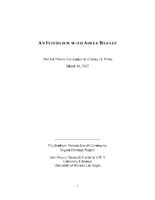
Transcript of interview with Adele Baratz by Claytee D. White, March 19, 2007
Date
Archival Collection
Description
Interview with Adele Baratz by Claytee White on March 19, 2007. In this interview, Baratz talks about her parents who came to the United States as teenagers from Russia and eventually settled in Las Vegas after a short time in California. She discusses the Jewish community in Las Vegas when she was growing up, and her father's job selling bootlegging supplies, then as a real estate broker, then as a bar owner. Baratz attended the Fifth Street Grammar School, which was built after a fire destroyed the original school, and Las Vegas High School. As a teenager, she worked at Nellis as a messenger and in the rations department, then went to nursing school in Baltimore at Sinai Hospital. She talks about her father's bar, "Al's Bar," that was popular with Union Pacific Railroad workers, and how the bar was forced out for the building of the Golden Nugget. Baratz recounts where her family lived, the growth of the Jewish community, and building the first synagogue on Carson Street.
Text
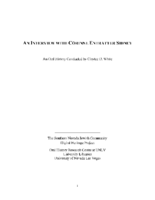
Transcript of interview with Corinne Entratter Sidney by Claytee White, June 5, 2007
Date
Archival Collection
Description
Interview with Corinne Entratter Sidney by Claytee White on June 5, 2007. In this interview, Sidney talks about growing up with privilege in California, where her father served as the attorney general. She attended school at UCLA and took acting classes and signed with United Artists. She met Jack Entratter in Los Angeles and moved to Las Vegas and worked as a Copa Girl. She discusses Jack Entratter's generosity and influence in town, and his style, and their lifestyle together. She mentions the likes of Frank Sinatra, Lena Horne and Sammy Davis, Jr. and her extravagant life living at the Sands. After Jack's death in 1971, she moved back to Los Angeles, returned to acting, and wrote a newspaper column. On a visit to Las Vegas with George Sidney after Sidney's wife Jane died, Corinne and George began dating and were married shortly after. They moved back to Las Vegas together for a slower pace. She describes her love of Las Vegas and its continued growth.
Corinne Sidney's life story makes for fascinating reading. She was born in 1937, the daughter of Alice Polk, former Ziegfeld showgirl, and Carl Kegley, an attorney. She attended U. of C. Berkeley, transferred to UCLA, and was spotted by a talent scout who convinced her to enter a Miss USA contest. Corinne's runner-up status in the Miss USA contest led to job offers in acting, so she decided to study acting. This, along with her childhood lessons in ballet, piano, singing, tap dance and horseback riding, led to a contract with United Artists, freelance work, television parts, and plays. Around the age of 18, Corinne met Jack Entratter. Their relationship brought her to Las Vegas, where she worked as a showgirl at the Sands for a few months, and where she married Jack a few years later. They lived a fabulous lifestyle which included travel, beautiful homes, and friendships with noted celebrities. Corinne went back to acting in Los Angeles after Jack passed away, but then segued into writing a gossip column and hosting a television show. She reconnected with an old friend (George Sidney) by writing the obituary for his wife, and within a few months they were married. The Sidney's moved back to Las Vegas, where Corinne still makes her home today.
Text
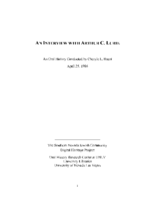
Transcript of interview with Arthur "Art" Lurie by Cheryle Bacot, April 25, 1986
Date
Archival Collection
Description
Interview with Arthur "Art" Lurie by Cheryle Bacot on April 25, 1986. Lurie talks about his family and upbringing with Kenny Washington, who was the first African American to sign with the National Football League. Lurie discusses knowing everybody in Las Vegas in the 1950s, being in the service/retail sector and watching the city grow. He operated several businesses including grocery stores and the liquor department at Wonder World. He talks about his love of boxing, serving on the boxing commission, and advantages of living in southern Nevada.
Arthur C. Lurie lived in Las Vegas for 33 years at the time of this 1986 oral history. He and his wife Eleanor had relocated from Los Angeles area to help run his brother-in-law's food market. Over the years his career would include the grocery, bar (Art's Place) and restaurant businesses; including being co-owner of the liquor store at Wonder World. He shares memories of adjusting to the more laid back culture of small town Las Vegas and how he feels like a native after watching the city grow over the past decades. Art was a founding member of Temple Beth Sholom, where he served as an early vice-president. Being in the non-gaming sector provided gave him the opportunity to work with youth programs and he started the Golden Gloves gym in Las Vegas. He judged over 40 title fights and had a long career on the Nevada Boxing Commission. Arthur Lurie past away in 2014 at the age of 96.
Text
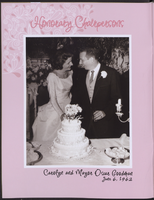
Program for The Wedding event at Temple Beth Sholom, June 6, 2010
Date
Archival Collection
Description
Booklet for the Wedding celebrations and vow renewals of couples at Temple Beth Sholom.
Text
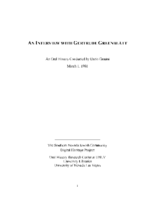
Transcript of interview with Gertrude Greenblatt by Dario Gratini, March 1, 1981
Date
Archival Collection
Description
Interview with Gertrude Greenblatt by Dario Gratini on March 1, 1981. In this interview Greenblatt talks about arriving in Las Vegas in the 1940s, and the changes that took place place such as population growth, price increases, employment requirements, and recreation. She also talks about the changes in utilities and environmental issues.
Text
Minutes Temple Beth Sholom Board of Directors meetings, September 1952 - December 1956
Date
Archival Collection
Description
The meeting minutes of the board of directors of Temple Beth Sholom, then known as the Jewish Community Center of Las Vegas, Inc., include the proceedings of meetings held from 1952 to 1956. Also included are periodic reports from committees of the board such as Jewish education, cemetery, and building committees, and budget reports.
Text
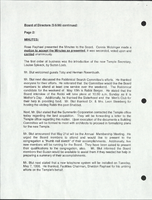
Minutes from Temple Beth Sholom Board of Directors meetings, 1995-1996
Date
Archival Collection
Description
Meeting minutes include reports from committees of the board, correspondence, and balance sheets.
Text
